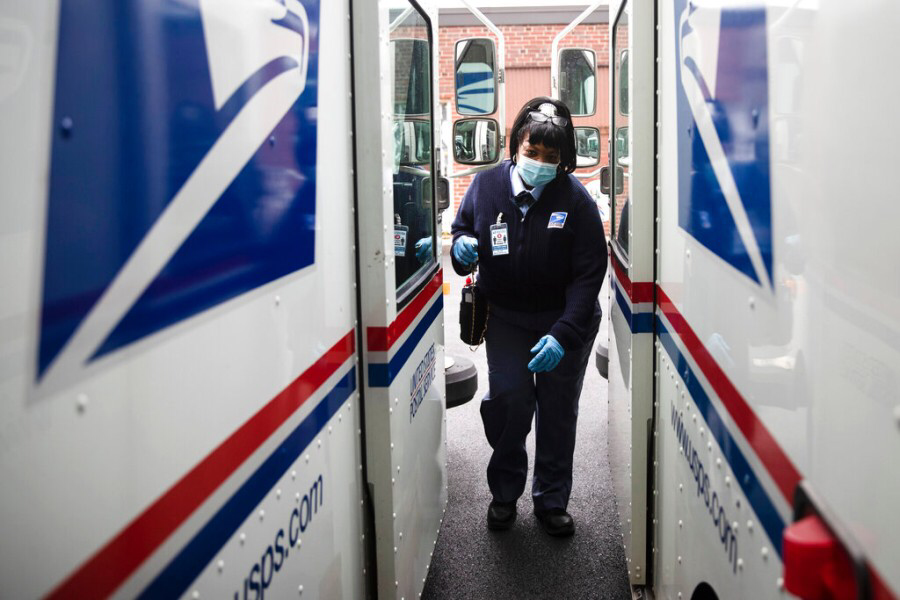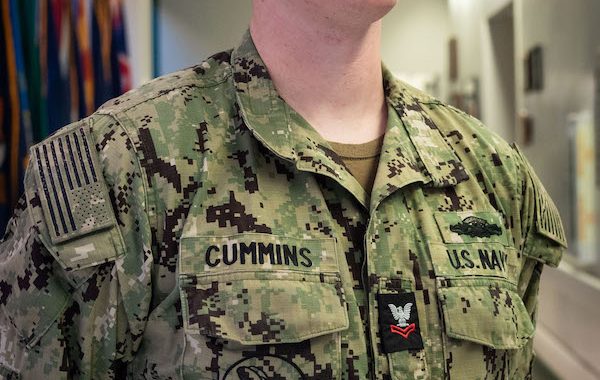USPS Delays Could Hit Georgia Military, Overseas Ballots
8 min read
Thousands of ballots cast by Georgians overseas or from international military installations are navigating mail slowdowns, casting anxiety over the only votes permitted to arrive after the polls close Tuesday in the state’s pivotal Senate runoff elections.
More than 18,000 overseas and military voters returned ballots for the Nov. 3 general election, out of the 26,418 voters who were registered and automatically received absentee ballots for the runoff, according to Federal Voting Assistance Program data. The Georgia Secretary of State’s Office declined to say how many new voters have registered since November.
Though that voting bloc represents a small percentage of Georgia’s 7.2 million registered voters, according to the Secretary of State’s Office data, election analysts say it’s enough to influence outcomes in the two dead heat races and, ultimately, control of the U.S. Senate, during an especially polarizing election season marked by record voter turnout and campaigns that have raised hundreds of millions of dollars.
But the hoops that overseas and military voters have to jump through to vote securely from abroad have been complicated by pandemic lockdowns and curfews and mail delays in various countries, as well as Postal Service delays on the U.S. side of the mail chain. Some voters have resorted to paying extra for express delivery through private mail carriers, checking their ballot trackers daily and calling their local elections offices to make sure their ballots arrived. In some cases, ballots mailed a month ago still haven’t shown up.
Susan Dzieduszycka-Suinat, president and chief executive of Overseas Vote, part of the nonprofit U.S. Vote Foundation, said she’s doubtful that the steps the U.S. Postal Service has taken to expedite the delivery of mail-in ballots will be enough for overseas ballots to make it in time.
“I just can’t imagine that the debacle in the Post Office didn’t have an impact.”
“We’ll see if that matters,” she said in an interview with The Washington Post. “I just can’t imagine that the debacle in the Post Office didn’t have an impact.”
The runoff was triggered after no candidate captured at least 50% of the vote in November. Now Republican incumbent Sens. Kelly Loeffler and David Perdue are locked in tight races with their respective Democratic challengers, the Rev. Raphael Warnock and Jon Ossoff at a time when political dynamics in the South are in flux and after the Peach State helped elevate a Democrat into the White House for the first time in 28 years.
The runoff also comes as President Donald Trump’s desperate phone call to overturn his loss to President-elect Joe Biden continues to reverberate. On Saturday, he pressed Georgia Secretary of State Brad Raffensperger to “find” enough votes to flip the race, citing meritless claims of election fraud.
Trump specifically referenced the importance of military voters to his campaign during that call, and Republicans are banking on a good turnout from them for the runoff. The nonmilitary voters – most of whom live abroad for family and employment, according to FVAP data – tend to sway progressive, buoying Democratic hopes.
Both are affected by delays within the U.S. Postal Service – which is grappling with coronavirus-related staffing shortages and residual holiday season package volumes – on top of already onerous steps to cast votes that will either return control of the Senate to Republicans and Majority Leader Mitch McConnell, R-Ky., or a 50-seat to 50-seat tie with Democrats, with Vice President-elect Kamala Harris able to cast tie-breaking votes.
“The significance of the overseas and military vote as decisive in Georgia’s election cannot be denied,” Dzieduszycka-Suinat said. “I still marvel over the fact that the candidates still don’t seem to realize that our numbers could impact their elections. I’m waiting for the candidates to address our constituency, meet with overseas and military voters and speak to our concerns. We are weighing in on these elections and now it is undeniable that we can sway the outcome of these tight elections.”
Military and overseas voters automatically received absentee ballots for the runoff election if they received one for the general election, but new voters had to sign up by Dec. 7. All of those mail-in ballots must be postmarked by Tuesday and received by Friday to be counted.
Service members abroad, and their families, use the mail service at their bases, the Military Postal Service Agency, which operates under the U.S. Postal Service. Peter Graeve, chief of plans and policy for the Military Postal Service Agency, told The Post in August that ballots returned by service members, their family and military contractors overseas between Sept. 1 and Dec. 8 would be treated as express mail.
Devine Davis recently left her role as a U.S. Army sergeant to travel and now lives with her family in Cuenca, Ecuador, where mail service has been suspended because the country is grappling with the pandemic and financial setbacks. This was the first election season in which she did not vote through the Military Postal Service Agency. She said she relied on shipper DHL for the general and runoff elections, paying the discounted price of $25 to send each ballot to Columbia County, Ga.
“We were hearing about voter suppression and a lot of ballots being rejected. The time frame was very tricky for us because it definitely takes longer for our stuff to get the United States,” Davis said. “It’s a lot of work to make sure our vote counts.”
“It’s a lot of work to make sure our vote counts.”
According to Georgia postal workers and mail agency data filed in federal court, mail-in ballot processing for the runoff has run smoothly statewide.
The Postal Service reported on-time ballot processing scores of 96 to 98% in the Atlanta postal district, the area responsible for more than 40% of the state’s mail-in ballot requests, since Dec. 29. Postal and election administration experts say the agency should process 97% of ballots on-time based on past performance.
Figures in the Gulf Atlantic postal district, which serves the region just south of Atlanta and all points east, are just as strong.
Voting rights advocates are encouraged by those results, particularly after the dismal scores the Postal Service recorded before the general election. On Election Day, the Atlanta district processed only 81.3% of ballots on time, meaning nearly 2 in 10 were potentially caught in postal facilities after the state’s ballot-acceptance deadline.
Nationwide, at least 150,000 ballots in the Nov. 3 vote – including 1,706 in postal districts that cover Georgia – were caught in U.S. Postal Service processing facilities and not delivered by Election Day, according to agency data. The Postal Service also struggled to track 6,624 mailed ballots in those districts, meaning they were recorded entering processing facilities but not exiting them, due to haphazard expediting procedures.
For the Senate runoff races, the Postal Service faces even stronger head winds than in November. The surging coronavirus pandemic has flattened the agency’s workforce, with close to 19,000 postal workers in the U.S. off the job as of Jan. 1 after contracting the virus or close contact to it, according to the American Postal Workers Union. In Atlanta alone, nearly 2,500 of the district’s 15,000 workers were out because of the virus, local labor leaders said.
Meanwhile, the agency continues to struggle with an avalanche of package deliveries from the holiday season that have clogged up the mail stream, leaving prescription medications, bills, and even local newspapers sitting undelivered in postal facilities. The Postal Service delivered only 70.6% of first-class mail items on time during the week of Dec. 12, the most recent data available, compared with better than 95% during the same period last year. (The Postal Service does not release data on package performance.)
On Dec. 28, the Postal Service initiated specific measures to expedite mailed ballots leading up to the Georgia runoff election, including processing them as priority mail express, sorting them separately at the processing plants to move them through more quickly and transporting them directly to boards of election to meet the state’s deadlines for domestic and overseas voters.
“The Postal Service remains fully dedicated to fulfilling our vital role in the nation’s electoral process – it has been our No. 1 priority for the past eight months,” agency spokeswoman Martha Johnson said in an email. “That dedication never wavered, and we took all steps necessary to deliver Election Mail timely and securely. We are equally committed to the timely and secure delivery of Election Mail for the Georgia runoff.”
Marylouise Serrato, executive director for American Citizens Abroad, which advocates for legislative issues impacting U.S. citizens living and working overseas, said it’s critical that this constituency votes – especially because they have to pay U.S. taxes, no matter where they live.
“It is their voice into Congress,” she said. “The overseas vote does make a difference, can make a decision in tight elections, and their vote is counted.”
Vote From Abroad, a nonpartisan voter support tool run by Democrats Abroad, encouraged voters to send in ballots by government-run postal mail by Nov. 30. For those mailing their ballots in December, the organization’s advice was to use a courier service to avoid mail delays. Both UPS and FedEx encouraged customers to pay attention to their state deadlines when mailing ballots through their services.
“It is their voice into Congress,” she said. “The overseas vote does make a difference, can make a decision in tight elections, and their vote is counted.”
Representatives from both Democrats Abroad and Republicans Overseas said their organizations were deluged with requests from voters seeking advice for securing their ballots for the November election. Leading up to the runoff, the organizations continued with voter education efforts but found election officials and voters seemed more familiar and confident navigating the system leading up to Jan. 5.
Wendy Gaylord, who lives in Melbourne, spent $77.13 to send her runoff ballot through FedEx’s expedited delivery to ensure it would circumvent Australia’s flight restrictions and arrive in Dekalb County, Ga., on time.
Laura Merton, a dual citizen living in Toronto, hasn’t lived in the U.S. since 1982. This year, she said, her general election ballot took a month to arrive in Chatham County, Ga., so she sent her runoff ballot a month early through a private carrier, paying $22.04, because she was worried about Postal Service slowdowns. According to the county’s ballot tracker, her ballot arrived on time but hasn’t been officially counted.
“Voting isn’t easy, but I feel like I would walk over coals all the way to Savannah if necessary,”
“Voting isn’t easy, but I feel like I would walk over coals all the way to Savannah if necessary,” she said. “Even though I haven’t lived in Georgia for a long time, my sense of being an American citizen traces right back to my childhood years in Savannah. Even now.”
Kevin Lee dropped off his ballot the first week of December, mailing it from the United Kingdom through the government-run postal service for about a dollar. But the ballot tracker shows it hasn’t made it yet to the Cobb County registrar and he can’t get in touch with an election official.
“I am worried that my runoff ballot won’t be received, even though the general election ballot was,” he said in an email. “While the process was manageable from my end, I feel that being allowed to fax or scan and email would make the process more accessible and efficient for most absentee voters.”
Like other county electorates, Cobb County Elections and Registration has been wrestling with high mail-in ballot volume to scan, process and verify, which takes time. Janine Eveler, the director of Cobb County Elections and Registration, said in an email that her office has been opening and scanning ballots since Dec. 21.
“The postal service is not in my control, but of course I want every valid vote to count,” she said.





